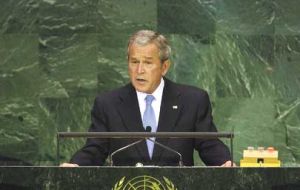MercoPress. South Atlantic News Agency
Bush calls for reform to make the UN “strong and vibrant”
 Pte. Bush, addresses the general debate of the 62 session of the General Assembly
Pte. Bush, addresses the general debate of the 62 session of the General Assembly United States President George W. Bush told the General Assembly that he supports a “strong and vibrant” United Nations empowered to carry out the shared goals of the world body and its host country, from addressing global pandemics to stopping the proliferation of weapons of mass destruction to dealing with climate change.
"As America works with the United Nations to alleviate immediate human needs, we are also coming together to address long-term challenges," President Bush told the annual high-level general debate. "Together, we are preparing for pandemics that could cause death and suffering on a global scale. Together, we are working to stop the proliferation of weapons of mass destruction. And together, we are confronting the challenges of energy security, environmental quality, and climate change." President Bush voiced appreciation for "the discussions on climate change led by the Secretary-General last night," when the two attended a dinner that capped a day of events devoted to galvanizing the international community on the issue. The US President, whose speech ranged over numerous global crises from hunger to violence in the Middle East, said resolving those problems "cannot be achieved overnight – and they cannot be achieved without reform of this vital institution." "The United States is committed to a strong and vibrant United Nations," he declared. He paid tribute to the UN's "noble efforts" to provide humanitarian assistance to those in need. "Today, more than half the world's food assistance comes from America," said the US President, announcing plans "to alleviate hunger under which America would purchase the crops of local farmers in Africa and other places – rather than shipping in food from the developed world." The aim would be to "help build up local agriculture and break the cycle of famine in the developing world," he said. President Bush also announced a series of measures against Myanmar, referring to the country by its former name. "The United States will tighten economic sanctions on the leaders of the regime and their financial backers. We will impose an expanded visa ban on those responsible for the most egregious violations of human rights – as well as their family members. We will continue to support the efforts of humanitarian groups working to alleviate suffering in Burma," he said. "I urge the United Nations and all nations to use their diplomatic and economic leverage to help the Burmese people reclaim their freedom." The President addressed the political situations in Cuba, Zimbabwe and elsewhere, and called for action to help those living in the Darfur region of Sudan, where "many are losing their lives to genocide." The UN, he said, must "live up to its promise to promptly deploy peacekeeping forces to Darfur." On poverty, he said the UN "provides vital economic assistance designed to help developing nations grow their economies and reach their potential." He called for global economic measures, saying "the best way to lift people out of poverty is through trade and investment." Open markets "ignite growth, encourage investment, increase transparency, strengthen the rule of law, and help countries help themselves," he said, calling for a successful conclusion to the Doha round of trade talks. "A successful Doha outcome would mean real and substantial openings in agriculture, goods, and services – and real and substantial reductions in trade-distorting subsidies," he said. President Bush spoke out against "the failures of the Human Rights Council," saying it had been "silent on repression by regimes from Havana and Caracas to Pyongyang and Tehran – while focusing its criticism excessively on Israel." The UN, he said, must reform the Human Rights Council in order "to be credible on human rights in the world." The US, a permanent member of the Security Council, supports reform of that body, he said. "We believe that Japan is well qualified for permanent membership on the Security Council, and that other emerging powers should be considered as well." The President pledged US leadership toward achieving "a world where opportunity crosses every border." "This is the founding conviction of my country. It is the promise that established this body," he said.




Top Comments
Disclaimer & comment rulesCommenting for this story is now closed.
If you have a Facebook account, become a fan and comment on our Facebook Page!